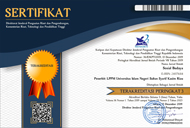PERAN ORANG TUA DALAM MEMBINA KARAKTER ANAK SHALEH SEBAGAI UPAYA MEWUJUDKAN MASYARAKAT MADANI MENUJU VISI RIAU 2020
Abstract
This article discusses the role of parents in Riau in fostering children's character to realize the civil society towards the vision of Riau in 2020; and the factors that support and hinder the development of the character of the pious child. By taking locations in three districts in the province of Riau, namely Kampar, Bengkalis, and Pekanbaru, in the end the authors conclude that the role of parents in Riau in fostering children's character pious categorized as good; ie 81, 89%. The factors supporting general lack of awareness of parents, father and mother together about the importance of children's education pious. In addition, the availability of media such as television, radio, mobile phones, the Internet as a learning resource also support the successful development of a pious character of the child. While constraints are (1) low levels of parental education; (2) lack of religious understanding about educating children; (3) the low level of the economy; (4) lack of care and supervision of a parent due to busyness of parents with their duties, especially for mothers-career; and (5) the effect of the environment, peers, and electronic media.
Keywords
Full Text:
PDFReferences
Abuddin Nata. 1997. Akhlak Tasawuf, (Jakarta: PT. Raja Grafindo Persada.
Baqir Syarif al-Qarashi. 2000. Seni Men-didik Islam. Jakarta: Pustaka Zahra.
Burhan Bungin. 2001. Metodologi Pene-litian Kualitatif. Rajawali Pers. Jakarta.
Didin Hafidhuddin, Islam Aplikatif, (Jakarta: Gema Insani Press, 2003
Endang Saifuddin Anshari,1992, Kuliah Al-Islam, Jakarta: Raja Grafindo Persada, cet III
H.A.R Tilaar (1999), Pendidikan, kebuda-yaan dan Masyarakat Madani Indo-nesia, Bandung: PT Remaja Rosda-karya.
Imam Ahmad bin Hambal, t.t.Musnad Juz II, (Beirut: Darul Kutub al Ilmiyah.
Imam Al-Ghazali,t..t. Ihya’ Ulumuddin Juz III, (Beirut: Dar Ihya al-Kutub al-Ilmiyah,)
Inun Mualifah, et.al., 2008. Perkembangan Peserta Didik Edisi Pertma, Sura-baya: Lapis-PGMI.
Kementerian Nasional, 2012. Pendidikan Karakter Terintegrasi Dalam Pembe-lajaran, Jakarta.
Lexi J. Moleong. 1999. Metodologi Pene-litian Kualitatif. (Bandung: Remaja Rosdakarya,
Lickona, 1992. T, Educating for Charac-ter, How Our Schools Can Teach Respect and Responsibility. Bantam Books, New York, 1992,
------- (1994), Raising Good Children: From Birth Through the Teenage Years. Bantam Books, New York.
Mattew B. Miles dan Michael A. Huber-man, Analisis data Kualitatif, terjem., Tjetjep Rohendi (Jakarta:UI Press, 1992.
Megawangi, R. (1999), Membiarkan Ber-beda? Sudut Pandang Baru tentang Relasi Gender. Pustaka Mizan, Bandung.
----------------------- 2007. Pendidikan Karakter, Jakarta.
Singgih D. Gunarsa dan Y. Singgih Gunarsa. 2004. Psikologi Praktis Anak Remaja dalam Keluarga, (Jakarta: Gunung Mulia.
Yuliana. 2008. Anakku Islam Itu Indah, Bogor: Mahabbah Pustaka.
DOI: http://dx.doi.org/10.24014/sb.v12i2.1937
Refbacks
- There are currently no refbacks.
Published by:
Center for Research and Community Development
Universitas Islam Negeri Sultan Syarif Kasim Riau
Jl. H. R. Soebrantas KM 15,5 ,Tuah Madani, Tampan,
Pekanbaru, Riau 28293
Indexed By:


.jpg)



